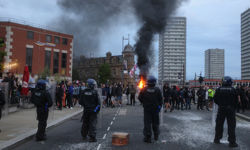
Speaking out against the Section 40-style costs sanctions and the sprawling inquiry into all media, senior local newspaper editors - speaking for the vast majority of the regional press industry – said the draconian measures would cause irreparable damage to the sector if enacted.
Archant chief content officer Matt Kelly said: "We are deeply concerned by the effect the Section 40 costs sanctions and proposed inquiry would have on our business. MPs must stand up for the local newspapers and local democracy by decisively rejecting both measures on Wednesday."
Newsquest editorial development director Toby Granville said: "MPs must show their support for local journalism and local newspapers on Wednesday by rejecting the anti-press amendments in the Data Protection Bill. Local and regional journalism is simply too important to our democracy to be sacrificed."
Maidenhead Advertiser editor Martin Trepte said: "The amendments represent an attack on press freedom which is completely unacceptable in our society. As a point of principle, we stand united against these attacks on free speech and urge all MPs to do likewise by voting against all the amendments on Wednesday."
Express & Star editor Keith Harrison said: "One of the fundamental principles at the Express & Star is our unwavering commitment to independent journalism which is completely free from any form of state interference. The sustained attempts to bring in Section 40 costs sanctions and kick off a sprawling inquiry into the media undermine this principle and we therefore oppose them."
On Wednesday (9 May 2018), MPs will vote on an amendment to the Data Protection Bill tabled by Ed Miliband MP which would establish a new statutory inquiry into all media organisations, drawing in all broadcast, print or online media and journalists and inevitably resulting in more measures damaging to free speech, says the News Media Association.
A separate amendment, continues the NMA, by Tom Watson MP, deputy leader of the Labour Party, would introduce draconian costs sanctions into the data protection regime, requiring publishers to pay all the claimants’ costs of legal actions brought against them as well as their own, win or lose. Despite modifications purporting to exempt local papers, the cost sanctions would still impact on 85 per cent of the local press.
Trinity Mirror Regionals editorial director Alan Edmunds said: "We do not want our journalists facing the spectre of Leveson 2 when attempting to report on the activities of public figures, entirely legitimately and in the public interest. Another huge inquiry would only embolden those who would rather keep their activities hidden from scrutiny."
KM Group editorial director Ian Carter said: "The fallout from the original Leveson Inquiry has already had a profoundly negative effect on the local newspaper sector. The last thing we need now, as we are adapting our business model to the digital age, is the distraction of another expensive and time consuming statutory inquiry which would most likely result in yet more bad law such as Section 40."
Johnston Press deputy editor-in-chief Gary Shipton said: "Local newspaper editors uphold an extremely high set of journalistic standards as underpinned by the law of the land and the effective and robust regulation of the Independent Press Standards Organisation. We take our responsibilities very seriously and the sustained attempts to blackmail us into joining a state-backed regulator via Section 40 are deeply insulting."
In an anonymous survey of local newspaper editors conducted by the News Media Association, 92 per cent of respondents said they did not think another “Leveson-style” inquiry into the media should take place with the remaining eight per cent saying they weren’t sure. Not one of the 68 survey respondents thought the inquiry should go ahead, says the association.












